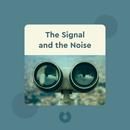The Signal and the Noise
The Signal and the Noise: Why So Many Predictions Fail — but Some Don't
Your highlights:Forecasting the economy is so difficult because it’s a complicated and dynamic system.
And not only the state of the economy is affected by a myriad of factors: the very basics of forecasting are also constantly in flux.
12 August, 2019 08:46 Share
Statistics-based forecasting alone is not enough – human analysis is still needed.
But many people don’t realize this. Instead, they try to get more and more information and economic variables to draw predictions from, believing that it will make predictions more accurate when, in fact, all it does is increase the amount of useless information – or noise – which in turn makes it harder to spot useful information – or the signal – hidden within.
12 August, 2019 08:49 Share
Many experts failed to predict the 2008 collapse of the US housing bubble.
Since CDOs were a completely new kind of financial instrument, agencies had to rely solely on statistical models based on the risk of individual mortgages defaulting. Unfortunately, this neglected the possibility of a large-scale housing crash which could bring down prices across the board.
12 August, 2019 08:50 Share
The second failure was committed by rating agencies regarding the riskiness of financial instruments called collateralized debt obligations (CDOs), which consisted of a bundle of mortgage debts. The idea was that, as homeowners made payments on their mortgages, investors who held CDOs would earn profits.
12 August, 2019 08:51 Share
Cautious, meticulous and diverse predictions tend to be better than brash ones.
Hedgehogs are typically brash and confident, claiming that they have discovered big, governing principles that the world adheres to: think Sigmund Freud and the unconscious. Foxes, however, tend to be more cautious and meticulous, contemplating matters from various perspectives and carefully weighing the pros and cons. They are also more likely than hedgehogs to rely on empirical evidence and data, willingly discarding their own ideologies and preconceptions and letting the data speak for itself.
12 August, 2019 08:56 Share
Stock markets are hard to beat because they tend to be efficient.
For one, it’s hard for one person to predict the behavior of the market well. In fact, one study showed that when seventy economists made stock market forecasts over a multi-year period, their aggregate prediction was always better than any individual’s.
12 August, 2019 11:55 Share
Why is beating the market so difficult? Because the stock market is usually very efficient, i.e., there are no easy, sure-fire wins to be had. Most trades are made by very smart, capable people on behalf of large financial institutions which have huge amounts of data and expertise at their disposal. This means that if a stock is over- or underpriced, the market will correct that very quickly.
12 August, 2019 11:56 Share
Stock market bubbles can be predicted by looking at stock prices and the P/E ratio.
What’s more, all their colleagues do the same, so it’s unlikely they’ll be singled out and fired. In fact, after the last three big crashes on Wall Street, only about 20 percent of staff lost their jobs, so there’s an 80 percent chance traders will keep their jobs even if they ignore the bubble.
12 August, 2019 11:58 Share
About the book:
The Signal and the Noise explains why so many expert predictions today fail spectacularly, and what statistical and probability tools are more up to the task of predicting real-world phenomena.
About the author:
Nate Silver is a statistician and writer who specializes in analyzing baseball and elections. He is perhaps most famous for correctly predicting the result of the 2008 US presidential election for 49 out of 50 states.
Blinkist takes outstanding nonfiction books and distills their key insights into made-for-mobile book summaries that you can read in just 15 minutes. Learn something new every day - on your smartphone, tablet or PC.
blinkist.com